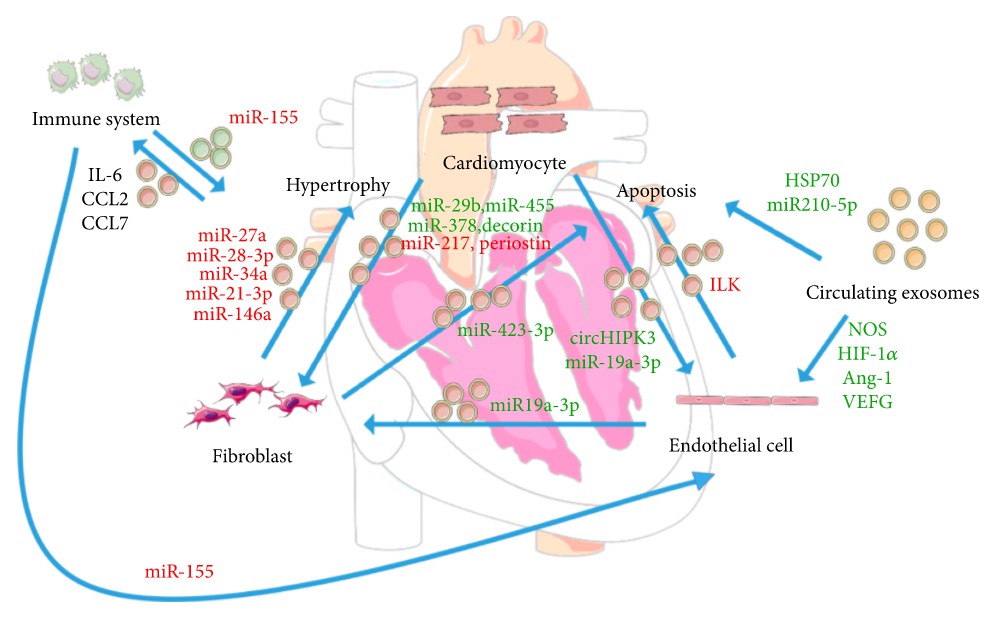Cardiovascular Disease Exosome Research Solution
Online InquirySince exosomes are a subpopulation of extracellular vesicles (EVs) containing a large number of bioactive molecules, they play an important role in cellular communication, including different cell populations, to maintain tissue homeostasis and coordinate adaptive responses to stress. In recent years, exosomes have earned a lot of attention in the cardiovascular field because the heart is a complex multicellular system that requires intercellular communication. As a central mediator in intercellular exchanges of information, exosomes have been reported to participate in a range of cardiovascular processes, including physiological and pathological activities, with beneficial or deleterious effects.
Exosomes in cardiovascular pathophysiology
Cardiovascular disease (CVD) is a major health problem that causes widespread mortality and morbidity worldwide. Researchers and professionals are actively seeking new and effective methods to manage CVDs, with substantial improvements in treatment strategies. Among them, exosomes have shown potential as diagnostic biomarkers and therapeutic tools for CVDs. The progression of CVD includes a series of underlying pathological changes, including cardiomyocyte apoptosis and hypertrophic growth, inflammation, cardiac fibrosis, and angiogenesis. Exosomes play a critical role in cellular communication as well as regulate downstream signal pathways associated with CVD progression by delivering signal molecules. In addition, the exosomes released from progenitor cells are biologically active and are key mediators for CVD stem cell therapy, a potential alternative to stem cell therapy.
 Fig. 1 The roles of exosomes in the pathophysiology of cardiovascular diseases. (Guo, Dong, et al., 2022)
Fig. 1 The roles of exosomes in the pathophysiology of cardiovascular diseases. (Guo, Dong, et al., 2022)
Application of exosomes in CVD treatment
Multiple cell types, especially some stem cells, such as cardiosphere-derived cells (CDCs), mesenchymal stromal cells (MSCs), cardiac progenitor cells (CPCs), induced pluripotent stem (iPS) cells, and embryonic stem cells, secrete exosomes containing bioactive molecules to modulate the cardiomyocyte apoptosis, angiogenesis, and other responses in cardiac injury.
- Mesenchymal stromal cell (MSC)-derived exosomes—cardiac injury repair
- Cardiosphere-derived cell (CDC)-derived exosomes—myocardial infarction
- Cardiac progenitor cell (CPC)-derived exosomes—ischemic cardiac injury
- Induced pluripotent stem (iPS) cell-derived exosomes—protect the heart against multiple stress
- Embryonic stem cell-derived exosomes—cardiac injury repair
- Cardiomyocyte-derived exosomes—cardiac fibrosis
Cardiovascular disease exosome research solution at Creative Proteomics
Creative Proteomics is a leading service provider in exosome research and analysis. Based on cutting-edge technology, advanced platforms, and strict analysis workflows, our experienced experts can provide customized and comprehensive exosome research services and solutions. We offer a range of exosome multi-omics services, including exosome proteomics, exosome metabolomics, and exosome lipidomics services to accelerate your relevant research progress.
| Exosome analysis services | |
|---|---|
| Exosome isolation and purification | Sucrose gradient centrifugation |
| Polymer-based exosome enrichment method | |
| Immunomagnetic bead method | |
| Size exclusion chromatography method | |
| Exosome identification | Nanoparticle tracking analysis (NTA) |
| Electron microscopy analysis | |
| Western blot | |
| Exosome marker assay | Isolation and enrichment of exosomal CD9, CD63, CD81, TSG101, HSP70 proteins |
| Exosome surface protein identification and quantitative analysis | |
| Exosome engineering | Exosome labeling and tracking |
| Cargo loading | |
| Engineered exosome production | |
| Cargo loading assessment | |
| Exosomes labeling and tracking | Exosome fluorescent labeling |
| Fluorescence exosome purification | |
| Fluorescent exosome concentration labeling | |
| Exosome multiomics analysis | Exosome proteomics analysis: Exosome protein profile identification Exosome protein composition analysis Exosome protein expression level analysis Exosome protein differential expression analysis |
| Exosome metabolomics analysis: Exosome differential metabolite screening Qualitative and quantitative analysis of target metabolites/metabolic pathways | |
| Exosome lipidomics analysis: Exosome lipid composition and level analysis Differential expression analysis of exosomal lipid molecules Qualitative and quantitative analysis of targeted lipid molecules | |
| Exosomal biogenesis and identification | Our capabilities will provide strong support for the study of exosome biogenesis and its identification. |
| Exosomal cargo and loading mechanism | Our services can greatly help the study of exosomal cargo and loading mechanism, facilitating the diagnostic and therapeutic applications of exosomes. |
| Exosome function research | In vitro analysis of the function of exosomes In vivo analysis of the function of exosomes |
If you are interested in exosomes in the cardiovascular field. Please contact us and find out how we can help you!
References
- Guo, Dong, et al. "Roles and clinical applications of exosomes in cardiovascular disease." BioMed Research International 2020 (2020).
- Bellin, Gloria, et al. "Exosome in cardiovascular diseases: a complex world full of hope." Cells 8.2 (2019): 166.
* For Research Use Only. Not for use in diagnostic procedures.



